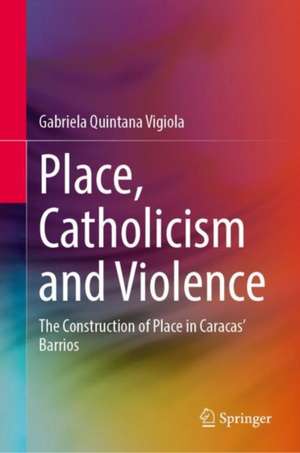Place, Catholicism and Violence: The Construction of Place in Caracas’ Barrios
Autor Gabriela Quintana Vigiolaen Limba Engleză Hardback – 28 mai 2024
Preț: 699.77 lei
Preț vechi: 823.26 lei
-15% Nou
Puncte Express: 1050
Preț estimativ în valută:
133.90€ • 140.18$ • 110.79£
133.90€ • 140.18$ • 110.79£
Carte disponibilă
Livrare economică 15-29 martie
Preluare comenzi: 021 569.72.76
Specificații
ISBN-13: 9789819946884
ISBN-10: 9819946883
Pagini: 197
Ilustrații: XV, 197 p. 66 illus., 65 illus. in color.
Dimensiuni: 155 x 235 mm
Greutate: 0.5 kg
Ediția:2024
Editura: Springer Nature Singapore
Colecția Springer
Locul publicării:Singapore, Singapore
ISBN-10: 9819946883
Pagini: 197
Ilustrații: XV, 197 p. 66 illus., 65 illus. in color.
Dimensiuni: 155 x 235 mm
Greutate: 0.5 kg
Ediția:2024
Editura: Springer Nature Singapore
Colecția Springer
Locul publicării:Singapore, Singapore
Cuprins
Introduction.- Place, Catholicism and criminal violence – a literature review.- Barrios in Caracas and the three case studies.- Barrios urban space and the everyday.- criminal violence in the barrio urban space.- Catholic processions in the barrio urban space.- Conclusion: Institutions, relationships and meaning of place.
Notă biografică
Dr. Gabriela Quintana Vigiola is a Senior Lecturer in Urban Planning and Urban Design at the University of Technology Sydney's School of Built Environment, Faculty of Design, Architecture and Building. She holds a PhD in Built Environment, aside from a Bachelor in Architecture, a Bachelor in Psychology (Major in Social Psychology) and a Master of Urban Design. Complementary to her academic role, she has been continuously involved as an industry consultant in urban design and urban planning. Her main practice and research focus on place, more specifically on current issues such as place-making, place-based policies and displacement affecting different populations in different contexts.
Textul de pe ultima copertă
This book explores the interwoven nature of place, Catholicism and violence in Caracas’ barrios. Using interdisciplinary perspectives to investigate themes of urban space, meaning as a psychosocial construct, criminal violence, and religiosity as culture, this book uncovers the underlying complexities of turning spaces into places through the built form, activities in the urban space and the meanings associated with it. Fundamental elements in the construction of place are used to understand the ways in which barrio residents conceive and construct the physicality of the private, public and religious spaces; how residents use the physical spaces of the barrios; and the psychosocial meanings residents associate with the spaces and activities. Using rich qualitative data and a case study design, the book relies on audio-visual data and interviews with organisers, residents and key participants in Petare, the largest barrio conglomeration in Caracas and Venezuela. Qualitative thematic analysis of participants’ experiences of Catholicism, violence and, ultimately, the construction of place exposes a unique argument: that meaningful urban spaces are embedded with emotions, memories, relationships, experiences and meanings, which turn them into places.
Caracteristici
Considers placemaking through the lenses of space, activities and meaning Incorporates culture as a fundamental aspect of place-making Uses rich qualitative data and case study design
